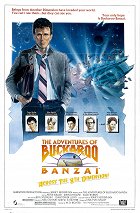Regie:
W.D. RichterDrehbuch:
Earl Mac RauchKamera:
Fred J. KoenekampMusik:
Michael BoddickerBesetzung:
Peter Weller, John Lithgow, Ellen Barkin, Jeff Goldblum, Christopher Lloyd, Lewis Smith, Rosalind Cash, Ronald Lacey, Matt Clark, Robert Ito, Pepe Serna (mehr)Streaming (2)
Inhalte(1)
Brilliant brain surgeon-rock star-and comic book hero Buckaroo Banzai just made scientific history! Shifting his Oscillation Overthruster into warp speed, he's the first man ever to travel to the Eighth Dimension and come back sane. But when his sworn enemy, the demented Dr. Lizardo, unleashes an evil army of inter-dimensional aliens, Buckaroo goes cranium to cranium with the madman in a battle that could result in the annihilation of the universe! (Verleiher-Text)
(mehr)Kritiken (2)
Buckaroo Banzai (so eine Art US Version des Tschechischen Jára Cimrman mit japanischen Wurzeln), enthüllt mithilfe seiner Rockband die geheime Invasion von Außerirdischen aus der 8. Dimension (von denen jeder John heißt und vom absolut überspielenden John Lithgow befehligt wird) und bei all dem spielt Musik vom Synthesizer. Mir fällt nichts ein, was ich noch hinzufügen könnte. Das Seltsamste an diesem Film ist, dass die Schöpfer, wenn sie eine Komödie drehen wollten, versagt haben. Und wenn sie es nicht versucht haben, sind sie trotzdem gescheitert.
()
Wes Anderson likes this. That’s a fact. The renowned offbeat filmmaker has admitted that he counts himself among the avowed fans of Buckaroo Banzai, which shouldn’t come as a surprise at all. We can find echoes of the film’s team of eccentric characters facing absurdly exaggerated obstacles with a straight face not only in Anderson’s direct homage, The Life Aquatic with Steve Zissou, but also in all of his other films. We can even say that Anderson’s first films, Bottle Rocket and Rushmore mirror the desire to live life along the lines of Buckaroo Banzai in the dull real world and with the same sincere naïveté that we experienced as young boys founding our own version of Our Gang. Starting with The Life Aquatic, Anderson finally had the means and the renown that allowed him to subsequently do nothing else but aesthetically polished paraphrases of Banzai-esque team-based movies freed from the bonds of reality. ____ If we leave aside the waggish conspiracies of fans and filmmakers who highlight the film’s incomprehensible and offbeat nature, Buckaroo Banzai comes across as a live-action antecedent of Adult Swim’s animated series, especially the channel’s retro-meta productions. Like Sealab 2021 and Mike Tyson Mysteries, Buckaroo Banzai is based on the comic-book ethos of classic team-based series such as Jonny Quest, G.I. Joe and Scooby-Doo with their trash premises and sincere naïveté. But its ethos also links it to later projects like Mister T (and perhaps even Chuck Norris: Karate Kommandos), which stood on the cult of personality of the central character, the semi-divine leader of the team. But unlike the stoner logic and subversive absurdity of Adult Swim’s productions, W.D. Richter and Earl Mac Rauch took the route of intellectual-nerdy camp. They thus take delight in the highly convoluted histories of the film’s world, characters and individual artifacts, and revel in references to the entire field of fantasy and pop culture, ranging from Thomas Pynchon and Orson Welles to rotoscopes and B-movie sci-fi to martial arts and pulp comic books. The whole project is imbued with a sense of tremendous exaggeration, as well as with the joy that comes with being able to childishly goof around in its world, leaving aside needless rationality. Thanks to that, this commercial failure became a beloved cult classic that appeals to the same group that its creators came from. The pastiche of cult movies and trash flicks itself became a cult movie that stimulates its viewers’ desire to again be young boys who thumb through comic books and hope that someday they can the sidekicks of their favourite heroes. But in this case, they rather know that’s not going to happen, but it’s fun to give it some thought. Buckaroo Banzai is thus actually Star Trek and Galaxy Quest rolled into one, though its fandom revolves around the meaning of watermelons instead of wildly overclever theories.
()


Werbung